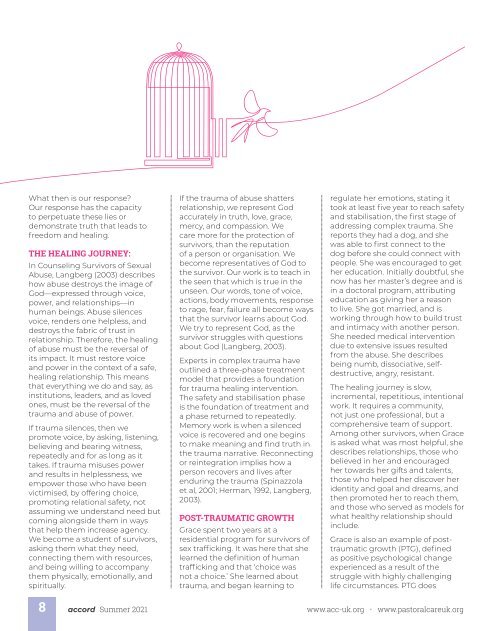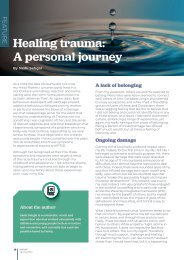ACC Accord Summer 2021 Issue 111
You also want an ePaper? Increase the reach of your titles
YUMPU automatically turns print PDFs into web optimized ePapers that Google loves.
What then is our response?<br />
Our response has the capacity<br />
to perpetuate these lies or<br />
demonstrate truth that leads to<br />
freedom and healing.<br />
THE HEALING JOURNEY:<br />
In Counseling Survivors of Sexual<br />
Abuse, Langberg (2003) describes<br />
how abuse destroys the image of<br />
God—expressed through voice,<br />
power, and relationships—in<br />
human beings. Abuse silences<br />
voice, renders one helpless, and<br />
destroys the fabric of trust in<br />
relationship. Therefore, the healing<br />
of abuse must be the reversal of<br />
its impact. It must restore voice<br />
and power in the context of a safe,<br />
healing relationship. This means<br />
that everything we do and say, as<br />
institutions, leaders, and as loved<br />
ones, must be the reversal of the<br />
trauma and abuse of power.<br />
If trauma silences, then we<br />
promote voice, by asking, listening,<br />
believing and bearing witness,<br />
repeatedly and for as long as it<br />
takes. If trauma misuses power<br />
and results in helplessness, we<br />
empower those who have been<br />
victimised, by offering choice,<br />
promoting relational safety, not<br />
assuming we understand need but<br />
coming alongside them in ways<br />
that help them increase agency.<br />
We become a student of survivors,<br />
asking them what they need,<br />
connecting them with resources,<br />
and being willing to accompany<br />
them physically, emotionally, and<br />
spiritually.<br />
If the trauma of abuse shatters<br />
relationship, we represent God<br />
accurately in truth, love, grace,<br />
mercy, and compassion. We<br />
care more for the protection of<br />
survivors, than the reputation<br />
of a person or organisation. We<br />
become representatives of God to<br />
the survivor. Our work is to teach in<br />
the seen that which is true in the<br />
unseen. Our words, tone of voice,<br />
actions, body movements, response<br />
to rage, fear, failure all become ways<br />
that the survivor learns about God.<br />
We try to represent God, as the<br />
survivor struggles with questions<br />
about God (Langberg, 2003).<br />
Experts in complex trauma have<br />
outlined a three-phase treatment<br />
model that provides a foundation<br />
for trauma healing intervention.<br />
The safety and stabilisation phase<br />
is the foundation of treatment and<br />
a phase returned to repeatedly.<br />
Memory work is when a silenced<br />
voice is recovered and one begins<br />
to make meaning and find truth in<br />
the trauma narrative. Reconnecting<br />
or reintegration implies how a<br />
person recovers and lives after<br />
enduring the trauma (Spinazzola<br />
et al, 2001; Herman, 1992, Langberg,<br />
2003).<br />
POST-TRAUMATIC GROWTH<br />
Grace spent two years at a<br />
residential program for survivors of<br />
sex trafficking. It was here that she<br />
learned the definition of human<br />
trafficking and that ‘choice was<br />
not a choice.’ She learned about<br />
trauma, and began learning to<br />
regulate her emotions, stating it<br />
took at least five year to reach safety<br />
and stabilisation, the first stage of<br />
addressing complex trauma. She<br />
reports they had a dog, and she<br />
was able to first connect to the<br />
dog before she could connect with<br />
people. She was encouraged to get<br />
her education. Initially doubtful, she<br />
now has her master’s degree and is<br />
in a doctoral program, attributing<br />
education as giving her a reason<br />
to live. She got married, and is<br />
working through how to build trust<br />
and intimacy with another person.<br />
She needed medical intervention<br />
due to extensive issues resulted<br />
from the abuse. She describes<br />
being numb, dissociative, selfdestructive,<br />
angry, resistant.<br />
The healing journey is slow,<br />
incremental, repetitious, intentional<br />
work. It requires a community,<br />
not just one professional, but a<br />
comprehensive team of support.<br />
Among other survivors, when Grace<br />
is asked what was most helpful, she<br />
describes relationships, those who<br />
believed in her and encouraged<br />
her towards her gifts and talents,<br />
those who helped her discover her<br />
identity and goal and dreams, and<br />
then promoted her to reach them,<br />
and those who served as models for<br />
what healthy relationship should<br />
include.<br />
Grace is also an example of posttraumatic<br />
growth (PTG), defined<br />
as positive psychological change<br />
experienced as a result of the<br />
struggle with highly challenging<br />
life circumstances. PTG does<br />
8 accord <strong>Summer</strong> <strong>2021</strong> www.acc-uk.org • www.pastoralcareuk.org



